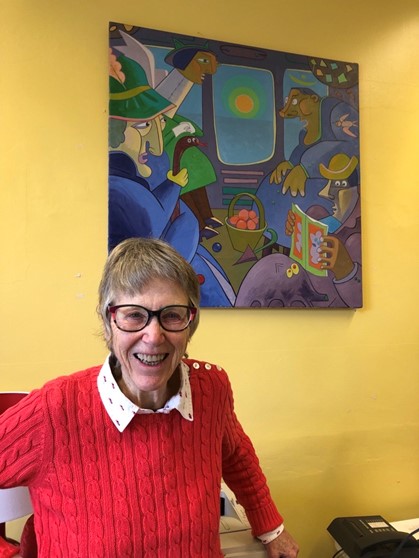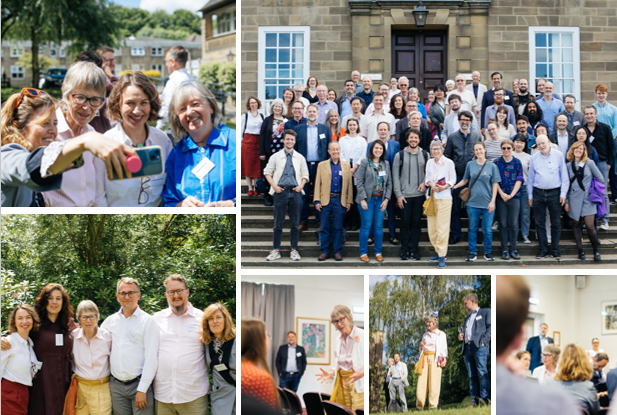Philosophy of Life: In conversation with Professor Nancy Cartwright (at 80)

On 22 June 2024, our Department of Philosophy threw a party to honour and celebrate the world-class academic achievements of our colleague, Nancy Cartwright, to mark the occasion of her 80th birthday.
Nancy’s exceptional contribution, not just to philosophical studies, but also to the life of the University, arises from a combination of academic brilliance, generosity of spirit, and tireless hard work. But don’t imagine that age is slowing her down any time soon!
At 80, Nancy combines a youthful energy, focus of maturity and a timeless, forward-thinking outlook with a regard for her colleagues and collaborators that has the tangible warmth of ‘family’. No surprise then that we chose to mark the occasion with a party, in honour of her extraordinary career, and with a guest list of her past and present research collaborators.
We caught her between research meetings and student supervisions for a few questions...
Why did you choose a life in philosophy?
I found myself growing up an intellectual in a small town in western Pennsylvania, part of a highly intellectual presbyterian church community. I was brought up as staunch Calvinist and learned at an early age to rehearse the rational arguments for and against the existence of god, proposed resolutions of the problems of evil, issues of freedom of the will and god's foreknowledge, and so forth.
I went off to university as a mathematics major, but was obviously primed for philosophy and fell in love with my philosophy courses. The university of Pittsburgh where I studied was growing a fabulous philosophy department with a newly founded centre for the philosophy of science. Central to that centre was my undergraduate physics professor, Allen Janis, and my philosophy of science teacher, Adolf Grunbaum (1928-2018). Also, my maths courses were terribly boring! So I ended up focussing on the philosophy of physics and logic.
What has shaped your career?
I have tended to do what I love and what I was good at!
I started out working in philosophy of Physics, initially at University of Maryland, and then Stanford University, but I was always interested in the social sciences - how they work, and how they might work better to understand and change the world. So later, when I was offered the job at London School of Economics (LSE), I took the opportunity to change direction from philosophy of natural science to philosophy of the social and economic sciences.
The philosophy of social sciences and economics is much harder than philosophy of physics, in my opinion! In the philosophy of social science, the 'net' of high quality research is far looser, meaning that it's easier for projects you start to simply fall through!
I loved being at LSE because throughout the school, there was a widespread general feeling that, despite the way that disciplines didn’t cooperate very much, all were there to help figure out social problems.
So it turned out that I am good at the kind of analytic philosophy that has respect. I was way better at this than philosophy of mathematics and physics. It came easily. I do love it and I happen to be good at it.
What brought you to Durham University?
Professor Robin Hendry! Robin was a postgrad at LSE when I first arrived there. We spent a lot of time talking together and kept in touch. Around 15 years ago, I encountered him at a conference in Athens, where he told me it would be lovely if I would move to Durham. I thought maybe it was time for a change, and laughingly said 'Ok, go whistle me up a job!'
I arrived here to find Durham’s Department of Philosophy a totally supportive and welcoming environment, rich in innovative ideas, including the bid programme on social inequality, with which I became associated. At the time, the University had just launched an exciting new programme to support 'The Engaged Humanities', encouraging scholars across the Faculty to interact more regularly and connect effectively with colleagues from other disciplines in Durham. In particular, I was asked to set up a centre for the engaged humanities - this was too exciting an opportunity to pass up! This is how CHESS (the Centre for Humanities Engaging Science and Society) was born.

Nancy Cartwright with past and present colleagues at her 80th party: Kenworthy Hall, St Mary's College, Durham, 22 June 2024 (Images: Donal Khosrowi Djen-Gheschlaghi)
To which areas of research have you contributed?
Oh, let me think… Studies of the philosophical issue of scientific realism, or 'are theories really true?'; understanding what the laws of science are and how they work; how models are used in the natural and social sciences; methods of causal inference; evidence-based policy; evidence and objectivity, especially for evidence-based policy.
Also, I co-founded the Stanford School of Philosophy, which stressed pluralism, particularism, and putting philosophy to practical use. At LSE, I founded the Centre for Philosophy of Natural and Social Science (CNPSS).
What do you think is your most important contribution to Philosophical studies?
Inside the profession, I have been most interested generically in seeing that the ideas and skills honed in philosophy are brought to interact with those from other domains in a very concrete way, in order to understand the world and change it for the better.
In order to facilitate respect for my area, I have tried to launch a new sub field, the philosophy of social technology, that uses philosophy interactively with other research and researchers in other fields, to figure out how better to understand and improve society.
Much of my work has been interdisciplinary, which is unusual in philosophy - even within philosophy I work collaboratively on joint projects and tend to publish joint papers. I think better in collaboration with others! The usefulness of our ideas are always broadened by working them through with other approaches, and applying them to solving other kinds of problems.
What are your thoughts about women in philosophy today?
There aren't enough of us! But many women I know have dropped out because they find conventional philosophy too inward-looking. It's not always the case that philosophy departments aren't making sufficient effort to hire women.
We should award more prestige to interdisciplinary work, and encourage projects at the edges of our discipline, where philosophy is interacting with other fields. This work currently is seen by conventional philosophers as 'borderline', and so not as important as 'pure' philosophical studies.
Are there women philosophers who have really inspired you?
Throughout my four undergraduate years at the University of Pittsburgh, I encountered only one woman lecturer, who was teaching Russian - her native language. I did encounter a woman philosopher, the magnificent Professor Elizabeth Anscombe (1919-2001), who came from the UK to give a seminar. Those who know anything about Elizabeth will recognise that she was extremely impressive and imposing - and I realised I wanted to be like her! Happily, we later became friends.
When it was time to apply to graduate schools, I was keen to avoid what seemed to me as 'standard, high prestige' departments, as it seemed to me the atmosphere there was highly competitive. At the time, a new department had just been founded at University of Illinois Chicago (Congress Circle campus), by the famous modal logician, Ruth Barcan Marcus (1921-2012). One of my undergraduate teachers recommended I go there, explaining that I could learn to be a philosopher most anywhere, but at Chicago Circle with Ruth, I would learn to survive as a woman philosopher!
Ruth became a dear friend and mentor to me for the rest of her life. The only advice of Ruth's I did NOT take was to avoid calling my first book 'How the Laws of Physics Lie', on account of it not being serious enough! This is the book for which I am most well-known…!
Should we encourage our scientists to engage more actively with philosophers?
It depends on whether the scientists are willing to work with the right kind of philosophers! Not everyone thinks the way sociologists think, so there can't always be an easy dialogue. But there is a need for more philosophers with the right skills to engage with interdisciplinary research, across many situations. For instance, I served on the US National Research Council’s panel for evidence for Social Science and Social Policy, alongside a famous science studies scholar. That panel interacted exceedingly well, and we (the science studies people) were acknowledged as having played an important role and made joint recommendations. These (and other) kinds of panels would benefit from a philosopher's input.
What's your advice to young philosophers today?
I don’t have any!! Philosophy has so many forms, and applications.
I think philosophy should be of practical use, but this is only one way of ‘doing’ philosophy. It's important that this kind of applied activity has at least the same prestige as conventional mainstream (‘pure’) philosophy (i.e. where philosophers speak primarily to other philosophers).
What else lights you up?
My family. I have marvellous daughters and granddaughters!
Find out more
Read more about Nancy’s research on her own website
_____
Ranked 5th in the UK for graduate prospects with a score of 87.8 per cent in the Times Good University Guide 2024, our Philosophy Department has also achieved worldwide notoriety, ranking 29th in the in the QS World University Rankings by Subject 2024.
Students learn how to think about difficult questions and the answers that can be given to them and finish their course equipped to make a positive impact on global debates and policy.
Feeling inspired? Visit our Philosophy webpages for more information on our undergraduate and postgraduate programmes.

